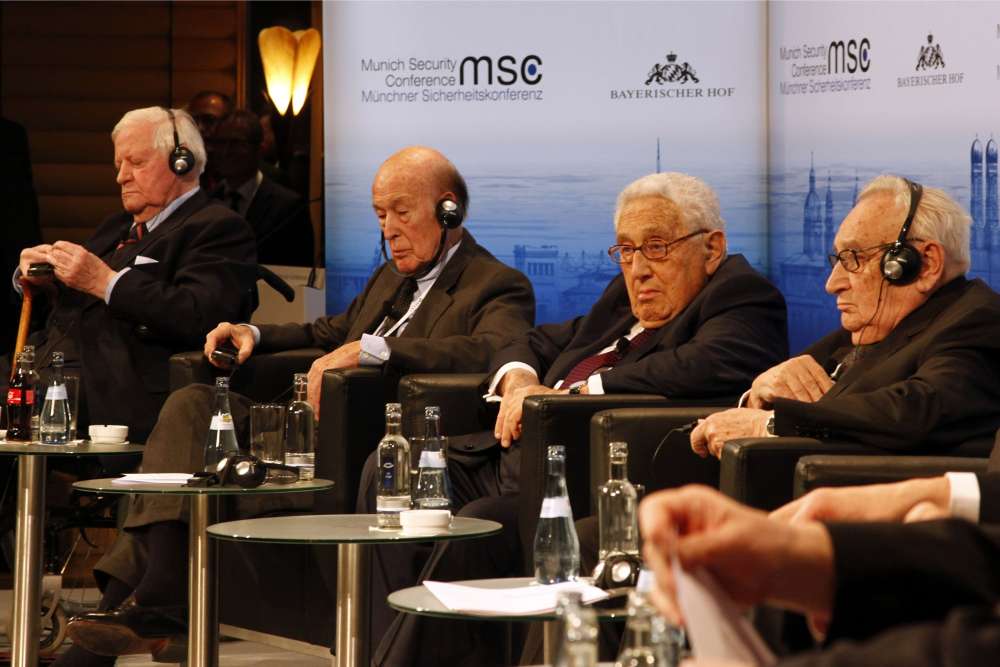Munich Security Conference: A Marketplace of Order?

Since we have noticed how messy our world has again become it is suddenly back in fashion to talk about order. This discussion goes far beyond Donald Trump’s latest tweet or the Chinese Communist Party’s last party congress, and it will last for quite a while. We are in for a long transition from an era of unipolarity to an uncertain future. Power and influence are moving from the West and North to the East and South; the uncontested hegemony of Western states — and Western corporations — has come to an end. Among states, corporations, and NGOs, the future distribution of power remains uncertain. State capitalism is alive and kicking, and we are only just beginning to understand both the incentives for and the constraints on collaboration between data giants and authoritarian regimes as well as their strategic implications.
In mid-February, like every year, around 500 people will come together in Munich, Germany, to discuss the state of international order and global security. Every year, the deficit of realistic and reliable ideas about questions of order appears to be growing. Our existing mechanisms for maintaining order are incapable of coping with the extent of conflict and violence we are facing in this period of transition. The UN Security Council is blocked whenever Russia chooses to challenge the Western-dominated order. China’s construction, primarily with economic means, of a parallel order in Asia does not affect the UN; indeed it is – quite correctly – no immediate threat to international peace and security. NATO plays an important role in the defense of Europe and —to a minimal extent — in the fight against the so-called Islamic State, but not in the pursuit of long-term solutions for peace and stability in Central Europe and the Arabian Peninsula. At present, the Organization for Security and Co-operation in Europe — with its observation mission in Ukraine — and the African Peace and Security Architecture around the UN and African Union may be the most effective players in a fragmented order.
In the words of its organizers, headed by Wolfgang Ischinger, the Munich Security Conference (MSC) “has become the major global forum for the discussion of security policy.” This is a big claim, and one that goes far beyond just hosting the “Academy Awards for security policy wonks,” as Ivo Daalder once affectionately described the conference.
Ischinger wants a “rather unregulated marketplace of ideas,” one that is “reflecting a globalized world.” And yet, even in 2018, the majority of the 500 participants will be male. Most of them by far will be white and middle-aged, have impressive job titles and come from Germany, the rest of Europe, and the United States (US). They will talk about the rules for a world whose population is by majority female, mostly under the age of 30 and of which 85 percent lives outside Europe and the US.
They will converse in carefully calibrated and tightly scheduled panel discussions. This is where participants pose the key questions to top political leaders, usually on very significant issues to which citizens rightly expect answers and solutions. But, of course, it is up to the ministers to decide what to say to them. That is “rather unregulated” only compared to the UN General Assembly.
What is more, the conference depends on the traditional political establishment. That does not make it easier to discuss new challenges like data and technology policy or well-known blind spots such as the conflicts in Africa in the substantial and innovative manner that would befit their strategic significance.
Above all, the Munich Security Conference is a place where a lot of decision-makers come together. This allows for the efficient delivery of pre-packaged messages and proposals, such as Putin’s challenge to the West in 2007. Such a vast number of confidential side-meetings and negotiations could never take place outside the conference setting. This is the MSC’s core business.
The conference is a “marketplace of ideas” only for those who already have plenty of power and influence in the traditional sense. Now, unfortunately, the market of ideas for security policy is hardly overflowing with good solutions. So, if the old, white men from the West are out of ideas, why not ask the young women from everywhere else? And, let us do so in ways that allow for more interaction, more debate and more innovation than the good old panel discussion.
…
A German version of this article first appeared in the February 2018 issue of Europäische Sicherheit & Technik.







